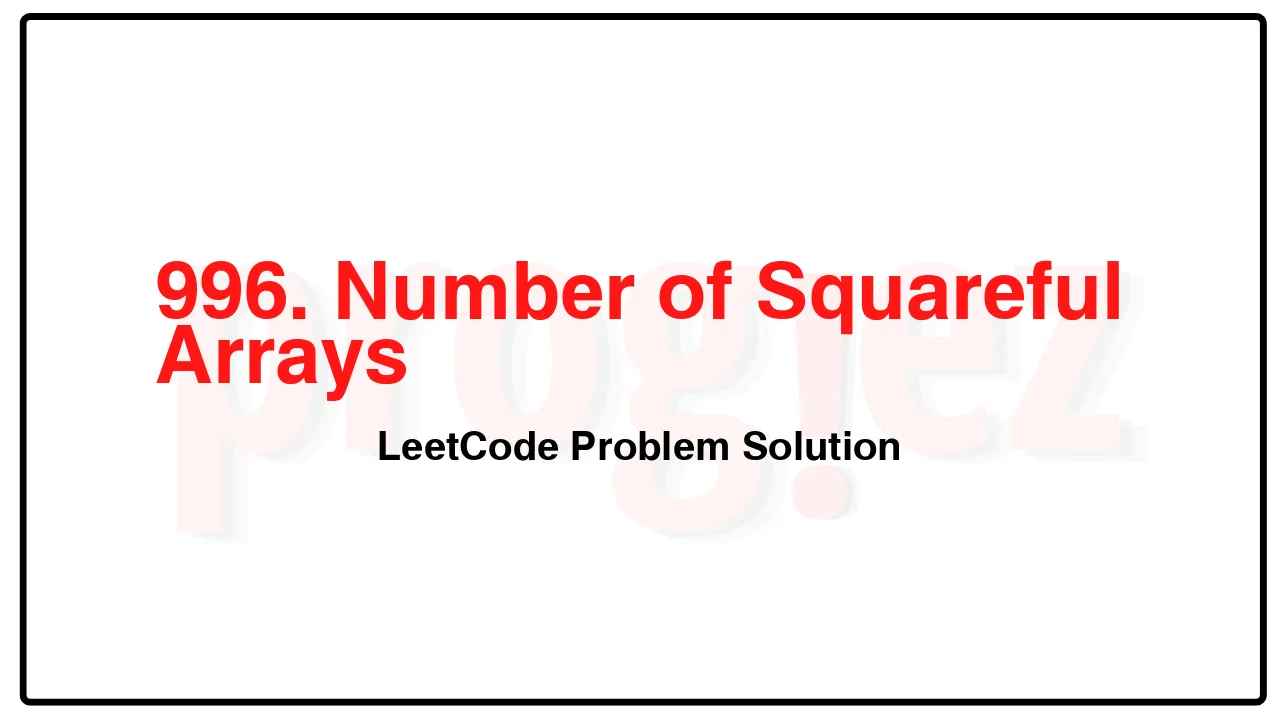996. Number of Squareful Arrays LeetCode Solution
In this guide, you will get 996. Number of Squareful Arrays LeetCode Solution with the best time and space complexity. The solution to Number of Squareful Arrays problem is provided in various programming languages like C++, Java, and Python. This will be helpful for you if you are preparing for placements, hackathons, interviews, or practice purposes. The solutions provided here are very easy to follow and include detailed explanations.
Table of Contents
- Problem Statement
- Complexity Analysis
- Number of Squareful Arrays solution in C++
- Number of Squareful Arrays solution in Java
- Number of Squareful Arrays solution in Python
- Additional Resources

Problem Statement of Number of Squareful Arrays
An array is squareful if the sum of every pair of adjacent elements is a perfect square.
Given an integer array nums, return the number of permutations of nums that are squareful.
Two permutations perm1 and perm2 are different if there is some index i such that perm1[i] != perm2[i].
Example 1:
Input: nums = [1,17,8]
Output: 2
Explanation: [1,8,17] and [17,8,1] are the valid permutations.
Example 2:
Input: nums = [2,2,2]
Output: 1
Constraints:
1 <= nums.length <= 12
0 <= nums[i] <= 109
Complexity Analysis
- Time Complexity: O(n \cdot 2^n)
- Space Complexity: O(n \cdot 2^n)
996. Number of Squareful Arrays LeetCode Solution in C++
class Solution {
public:
int numSquarefulPerms(vector<int>& nums) {
int ans = 0;
ranges::sort(nums);
dfs(nums, vector<bool>(nums.size()), {}, ans);
return ans;
}
private:
void dfs(vector<int>& nums, vector<bool>&& used, vector<int>&& path,
int& ans) {
if (path.size() > 1 && !isSquare(path.back() + path[path.size() - 2]))
return;
if (path.size() == nums.size()) {
++ans;
return;
}
for (int i = 0; i < nums.size(); ++i) {
if (used[i])
continue;
if (i > 0 && nums[i] == nums[i - 1] && !used[i - 1])
continue;
used[i] = true;
path.push_back(nums[i]);
dfs(nums, std::move(used), std::move(path), ans);
path.pop_back();
used[i] = false;
}
}
bool isSquare(int num) {
const int root = sqrt(num);
return root * root == num;
}
};
/* code provided by PROGIEZ */996. Number of Squareful Arrays LeetCode Solution in Java
class Solution {
public int numSquarefulPerms(int[] nums) {
boolean[] used = new boolean[nums.length];
Arrays.sort(nums);
dfs(nums, used, new ArrayList<>());
return ans;
}
private int ans = 0;
private void dfs(int[] nums, boolean[] used, List<Integer> path) {
if (path.size() > 1 && !isSquare(path.get(path.size() - 1) + path.get(path.size() - 2)))
return;
if (path.size() == nums.length) {
++ans;
return;
}
for (int i = 0; i < nums.length; ++i) {
if (used[i])
continue;
if (i > 0 && nums[i] == nums[i - 1] && !used[i - 1])
continue;
used[i] = true;
path.add(nums[i]);
dfs(nums, used, path);
path.remove(path.size() - 1);
used[i] = false;
}
}
private boolean isSquare(int num) {
int root = (int) Math.sqrt(num);
return root * root == num;
}
}
// code provided by PROGIEZ996. Number of Squareful Arrays LeetCode Solution in Python
class Solution:
def numSquarefulPerms(self, nums: list[int]) -> int:
ans = 0
used = [False] * len(nums)
def isSquare(num: int) -> bool:
root = math.isqrt(num)
return root * root == num
def dfs(path: list[int]) -> None:
nonlocal ans
if len(path) > 1 and not isSquare(path[-1] + path[-2]):
return
if len(path) == len(nums):
ans += 1
return
for i, a in enumerate(nums):
if used[i]:
continue
if i > 0 and nums[i] == nums[i - 1] and not used[i - 1]:
continue
used[i] = True
dfs(path + [a])
used[i] = False
nums.sort()
dfs([])
return ans
# code by PROGIEZAdditional Resources
- Explore all LeetCode problem solutions at Progiez here
- Explore all problems on LeetCode website here
Happy Coding! Keep following PROGIEZ for more updates and solutions.